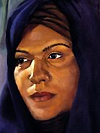|
Deborah
1. Name of the wife of Lappidoth. She was a
prophetess of Ephraim, as well as the fourth and only female judge of pre-monarchic Israel,
who judged Israel and incited Barak to fight against Sisera, the Captain of Jabin, king of
Hazor (רחָצ). In Hebrew known as
Devorah, meaning “bee”.

2. Name of the nurse of Rebekah, who accompanied her from the house of Bethuel. In
Hebrew known
as
Devorah.

Devorah (דְּבוֹרָה)
Hebrew. “Bee”. Hebrew name for
Deborah.
Collectively, her Hebrew name may refer to a swarm of bees and may thus
be understood as a noun of unity.

Desiderius Erasmus
Latin-Greek. “Desire desired”. A Dutch Catholic
theologian and
Christian humanist, who is fully known as Desiderius
Erasmus Roterodamus, i.e. “of Rotterdam”, where he was born somewhere
between 1466 and 1469, his birthday being October 27. In the Low Countries of the 15th century it had
become a customary trend to Latinize ones name, usually to reveal a
pretension of higher learning and often including ones place of origin.
With no regulatory body to control this, anyone could alter his or her
name at free will, often dropping ones family name for a humanist tag.
Erasmus initially chose the Latinized scholarly name Herasmus
Rotterdammensis, which he later changed into Erasmus Roterodamus.
Deisderius comes from the Latin noun desiderium, the latter word
is derived from the Greek adjective erásmios (ἐράσμιος). He lived
during the
Reformation and rather than jumping on the Protestant
bandwagon, he remained loyal to the Catholic Church, which he committed
himself to reform from within, continuously criticizing certain
Christian popular beliefs, abuses and practices of that period. By
attacking the Church's abuse of power and lack of discipline among its
clergy, whilst not siding with the Protestants, he soon fell between two
stools, disappointing and angering both sides. He died in Basel in 1536,
the same year as his contemporary William Tyndale.


Deuterocanonical Books
Books that the Catholic Church, as well as the
Eastern, Ethiopian and Oriental Orthodox Churches include in the Old
Testament, but which are not in the Jewish Tanakh. Traditionally
Protestant
Christians do not include these books in the Bible.

Diet of
Speyer
A series of imperial assemblies of the Holy Roman
Empire held in the city of Speyer (now in Germany) during the 16th
century, most notably those in 1526 and 1529, which played key roles in
the
Protestant
Reformation.
At the 1526 Diet, the emperor, Charles V, allowed each prince to enforce
religious reform in his own territory temporarily, effectively
tolerating
Lutheran practices. At the 1529 Diet,
the emperor reversed this decision, seeking to restrict the spread of
Protestantism.
In response, several
Lutheran princes and representatives
issued a formal protest (protestatio), asserting their right to maintain
the reforms in their territories. This act of protest gave rise to the
term “Protestant” and marked a defining moment in the history of the
Reformation.
 |